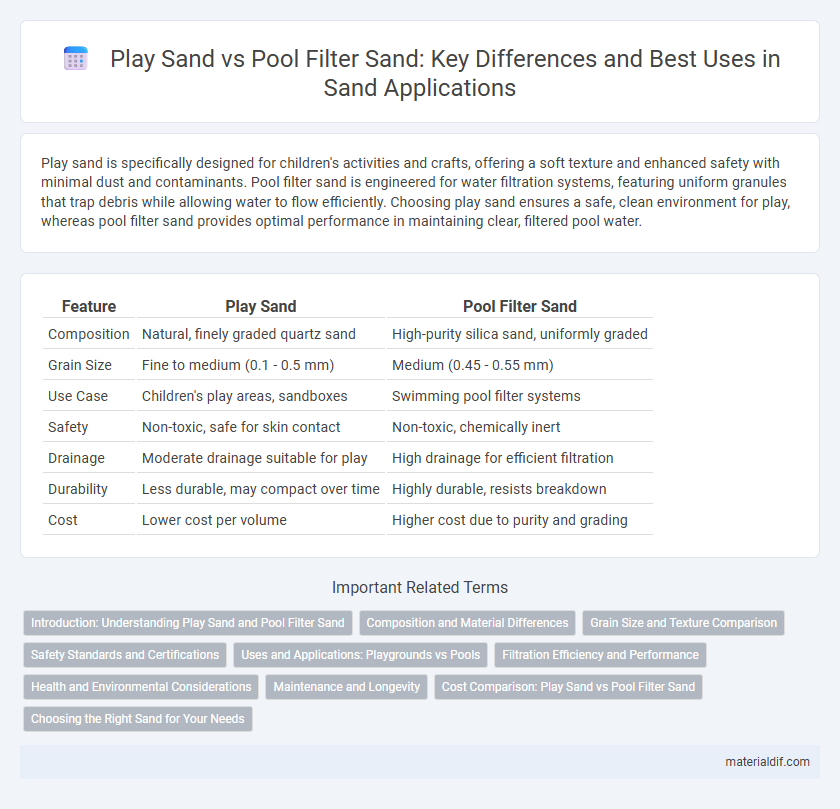Play sand is specifically designed for children's activities and crafts, offering a soft texture and enhanced safety with minimal dust and contaminants. Pool filter sand is engineered for water filtration systems, featuring uniform granules that trap debris while allowing water to flow efficiently. Choosing play sand ensures a safe, clean environment for play, whereas pool filter sand provides optimal performance in maintaining clear, filtered pool water.
Table of Comparison
| Feature | Play Sand | Pool Filter Sand |
|---|---|---|
| Composition | Natural, finely graded quartz sand | High-purity silica sand, uniformly graded |
| Grain Size | Fine to medium (0.1 - 0.5 mm) | Medium (0.45 - 0.55 mm) |
| Use Case | Children's play areas, sandboxes | Swimming pool filter systems |
| Safety | Non-toxic, safe for skin contact | Non-toxic, chemically inert |
| Drainage | Moderate drainage suitable for play | High drainage for efficient filtration |
| Durability | Less durable, may compact over time | Highly durable, resists breakdown |
| Cost | Lower cost per volume | Higher cost due to purity and grading |
Introduction: Understanding Play Sand and Pool Filter Sand
Play sand is specially processed to be soft, clean, and safe for children's use in playgrounds and sandboxes, typically free from harmful chemicals and debris. Pool filter sand is composed of durable, uniformly sized silica grains designed to trap impurities effectively within pool filtration systems. Understanding the distinct properties of play sand and pool filter sand is essential for selecting the appropriate type based on safety requirements and functional performance.
Composition and Material Differences
Play sand consists primarily of finely ground quartz with a smooth texture designed for safe use by children, typically washed and screened to remove dust and debris. Pool filter sand is composed of high-purity silica sand with a coarser grain size to maximize filtration efficiency, ensuring effective removal of particles from pool water. The key compositional difference lies in the grain size and purity, where play sand emphasizes safety and softness, and pool filter sand prioritizes durability and filtration performance.
Grain Size and Texture Comparison
Play sand features finer grains typically ranging from 0.1 to 0.5 millimeters, offering a soft texture ideal for children's activities and sculpting. In contrast, pool filter sand consists of coarser grains, usually between 0.45 and 0.55 millimeters, designed to efficiently trap debris while maintaining water flow. The texture difference impacts usability; play sand's smoothness enhances tactile experience, whereas pool filter sand's angular grains maximize filtration effectiveness.
Safety Standards and Certifications
Play sand and pool filter sand differ significantly in safety standards and certifications, with play sand typically meeting ASTM F963 standards for non-toxicity and fine grain size suitable for children's play areas. Pool filter sand is graded for optimal filtration efficiency and often certified by NSF/ANSI Standard 50 to ensure it meets safety requirements for water treatment. Choosing sand that complies with these specific certifications is crucial to prevent health risks and maintain safety in their respective uses.
Uses and Applications: Playgrounds vs Pools
Play sand is specifically designed for children's playgrounds, offering a fine, soft texture that is safe and comfortable for play activities, while pool filter sand is coarser and engineered to trap impurities in pool water filtration systems. Play sand enhances sensory play and is non-toxic, making it ideal for environments like sandboxes and playgrounds. Pool filter sand optimizes water clarity and filtration efficiency, crucial for maintaining hygienic and clear swimming pool water.
Filtration Efficiency and Performance
Play sand and pool filter sand differ significantly in filtration efficiency and performance; pool filter sand is specifically graded to have uniform particle size, which enhances its ability to trap fine debris and contaminants effectively. Play sand, with its irregular and coarser grains, is less efficient in filtration applications, making it unsuitable for use in pool filters where water clarity and purity are critical. Using pool filter sand ensures optimal water flow rates and maximum filtration capacity, maintaining cleaner and safer pool water.
Health and Environmental Considerations
Play sand is specifically designed to be non-toxic, dust-free, and safe for children's skin, reducing health risks such as respiratory irritation and allergic reactions. Pool filter sand, often composed of crushed quartz or silica, can pose health hazards like silica dust exposure, which is linked to lung disease when inhaled over time. Environmentally, play sand is usually sourced and processed to minimize impact, while pool filter sand, due to its industrial extraction, may contribute more to habitat disruption and pollution.
Maintenance and Longevity
Play sand requires less frequent maintenance due to its coarse texture that resists compaction and supports drainage, making it ideal for children's play areas. Pool filter sand, designed with uniform granule size and higher density, demands regular backwashing to remove trapped debris and maintain filtration efficiency, ensuring prolonged longevity of the pool system. Choosing the correct sand type based on specific use cases directly influences maintenance routines and extends operational lifespan.
Cost Comparison: Play Sand vs Pool Filter Sand
Play sand typically costs between $5 to $10 per 50-pound bag, making it a budget-friendly option for recreational use. Pool filter sand averages around $15 to $25 per 50-pound bag, reflecting its specialized filtration properties and higher purity standards. The price difference highlights pool filter sand's functional benefits, while play sand offers affordability for general play and landscaping purposes.
Choosing the Right Sand for Your Needs
Play sand features fine, rounded grains ideal for children's use in playgrounds and sandboxes, ensuring safety and comfort. Pool filter sand, typically made of higher-density silica with angular grains, is specifically designed to trap impurities effectively in pool filtration systems. Selecting the right sand depends on whether the application prioritizes safety and smooth texture for play or robust filtration performance for water cleanliness.
Play Sand vs Pool Filter Sand Infographic

 materialdif.com
materialdif.com